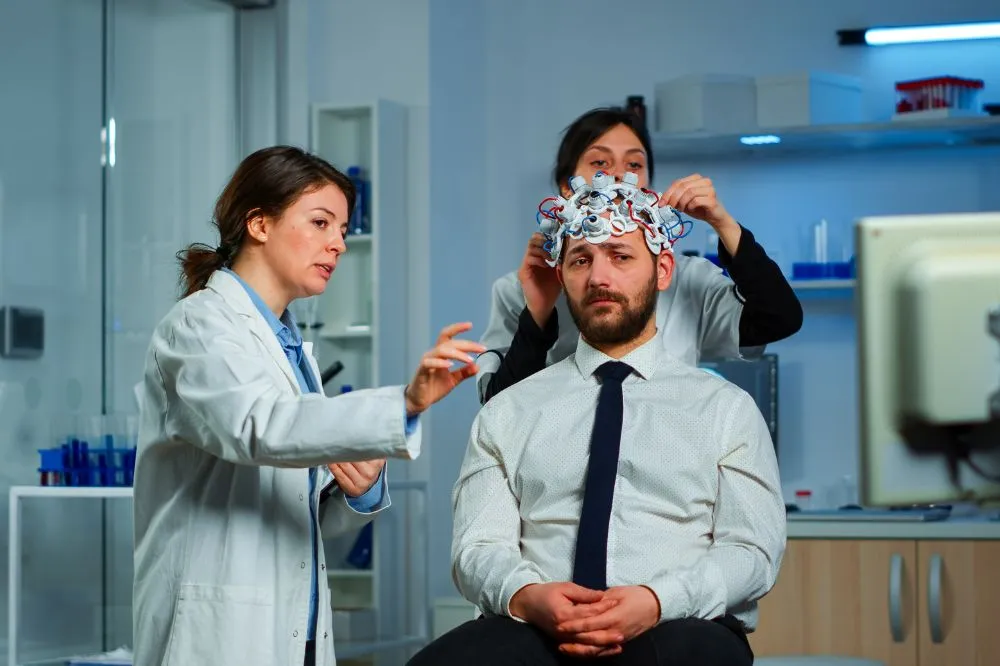Summary: A study led by LSU Health New Orleans researchers found evidence that a neurotoxin known as BF-LPS, derived from the bacteria Bacteroides fragilis in the gut, contributes to the development of Alzheimer’s disease. The study also found that adequate intake of dietary fiber may be able to prevent this process. The findings suggest a potential link between gut health and the development of Alzheimer’s disease and may lead to new diagnostic and therapeutic strategies for managing the disease.
Did you wonder why a century of extensive research into Alzheimer’s failed to discover a potent remedy for the condition? Well, the reasons are simple, not only Alzheimer’s pathogenesis (disease development), even its etiology (cause of the condition) remains poorly understood. It appears that Alzheimer’s occurs due to many reasons. In recent years, researchers have started paying more significant attention to the role of the gut-brain axis and gut microbiota in Alzheimer’s development.
Infection, toxins, and gut health have been proposed as potential contributing factors in the development of Alzheimer’s disease. Studies have suggested that certain infections, such as the herpes simplex virus, may increase the risk of developing Alzheimer’s. Toxins, such as heavy metals and pesticides, may also play a role in the disease. Additionally, a growing body of research suggests that gut health and the gut microbiome may contribute to Alzheimer’s.
The gut microbiome is the collection of microorganisms that live in the gut and play important roles in digestion, immune function, and other bodily processes. Dysregulation of the gut microbiome has been linked to a number of neurological disorders, including Alzheimer’s. However, more research is needed to fully understand the role of these factors in the development of the disease.
The study led by Drs. Yuhai Zhao and Walter J Lukiw at the LSU Health New Orleans Neuroscience Center and the Departments of Cell Biology and Anatomy, Neurology, and Ophthalmology have found evidence that a molecule containing a potent microbial-generated neurotoxin (lipopolysaccharide or LPS) derived from the Gram-negative bacteria Bacteroides fragilis in the human gastrointestinal (GI) tract generates a neurotoxin known as BF-LPS. This neurotoxin, BF-LPS, is a pro-inflammatory toxin that contributes to the development of Alzheimer’s disease. The study also found that adequate intake of dietary fiber can head off the process.
The study found that a neurotoxin called BF-LPS, which comes from bacteria in the gut, can contribute to the development of Alzheimer’s disease. The BF-LPS travels from the gut to the brain, causes inflammation in brain cells, and harms a protein that helps keep brain cells healthy. Unfortunately, this harm eventually leads to brain cells dying, as seen in Alzheimer’s disease.
The study also found that the gut microbiome, the collection of microorganisms living in the gut, plays an important role in the development of Alzheimer’s disease. The number of bacteria that produce BF-LPS can be controlled by eating enough dietary fiber.
The study suggests that understanding the connection between the gut, the brain, and Alzheimer’s disease could lead to new ways to diagnose and treat the disease. It is estimated that people in the US eat an average of 10-15 grams of fiber daily. The USDA recommends that women up to age 50 consume 25 grams a day and men 38 grams. After age 50, women should eat 21 grams daily and men 30 grams. Alzheimer’s disease is the most common cause of dementia and is among the leading cause of death in the US. It is estimated that 5.8 million people over 65 in the US have Alzheimer’s disease, which is projected to increase to 13.8 million by 2050.
This study highlights the importance of gut health in the development of Alzheimer’s disease and suggests that dietary fiber may play a role in preventing its development. This study’s findings can lead to new diagnostic and therapeutic strategies for managing Alzheimer’s disease and other neurodegenerative disorders. However, it is important to note that further research is needed to fully understand the relationship between gut health, dietary fiber, and Alzheimer’s disease.
It is our mission to bring real hope and transformational change to patients who would otherwise be consigned to a lifetime of medications, doctor’s visits, and suffering. We expose misaligned incentives and return the power of health to the individual. We believe empowered individuals change their communities. We use a combination of lifestyle intervention, medication management, and emerging scientific research to help our patients. When you are ready or have questions, reach out.
Medical Disclaimer: Keep in mind that the content provided is not direct medical advice for patient care, but is provided for thoughtful discussion.
The Bottom Line
Addictionology Center has expertise in managing mental disorder symptoms as well as guided treatments in opioid addiction. Our specialists offer you treatment right in the comfort of your home through our telehealth addiction treatment program.






